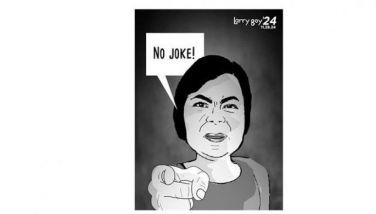Peace & order, not open skies, to lure tourists
July 2, 2002 | 12:00am
An open skies policy is not the answer to the reluctance of tourists to visit the Philippines, but erasing the country’s image abroad as an unsafe destination, said tourism groups which again refuted claims by some sectors that open skies will spur tourism.
"Unless the government addresses the peace and order problem and the threat of being kidnapped by the Abu Sayyaf and other kidnapping groups, no foreigner will visit the country even if we give unlimited access to foreign airlines," the Save Our Skies (SOS) Movement said.
The SOS, which is made up of tour and travel groups, freight forwarders and other tourism-related businesses, said the number of tourists has dramatically dropped because of the negative coverage given by the international media to the kidnappings in Mindanao and the deteriorating peace and order situation.
"Who will come here if what foreigners read are news about tourists being victimized by holduppers, Ativan gang members, snatchers and other criminal elements?" the SOS asked. "Those who are calling for open skies to boost our slumping tourism industry are giving a wrong prescription to an ailment," it added.
Open skies is unrestricted flights between two countries.
Meanwhile, an executive of Hong Kong’s Cathay Pacific said he sees the United States’ version of open skies as a "deeply flawed model for air-services liberalization."
David Turnbull, deputy chairman and chief executive of Cathay Pacific, said in an article that appeared in the Asian Wall Street Journal that open skies "would do nothing to promote real competition but would simply advance the interests of one or two already dominant US carriers."
Turnbull, formerly Philippine manager of Cathay Pacific, said the call for open skies by the US is unfair considering that American airlines have received huge cash injection (about $15 billion) by the US federal government after Sept. 11, 2001.
"Open skies is not the only model for liberalization. The story of Asian aviation proves that, progressive liberalization – with the goal of promoting fair competition across all market segments – is a respectable and credible alternative approach and has been adopted almost universally for intra-Asia air-services relationships, even by countries like Singapore and Korea which have signed open skies agreements with the US," he said.
Turnbull, a popular figure in the airline and tourism industry in the Philippines warned that open skies would be unprofitable for smaller airlines, particularly if they are competing with the mega carriers of the rich countries like the US.
Earlier, Philippine Airlines (PAL) called on the US to open up the US domestic market to PAL flights as part of its air liberalization efforts.
PAL president Avelino Zapanta said Washington should allow foreign carriers like PAL to operate between US points in the same manner that the US wants free access to the Philippines.
"Everything must be reciprocal. If we must go into open skies, everybody, including the big and powerful, should open their markets. It can’t be just small nations like the Philippines," he said.
He said the playing field is lopsided in favor of American carriers, which have received $15 billion in direct state aid after the Sept. 11 terrorist attacks and $32 million in insurance cover.
"Unless the government addresses the peace and order problem and the threat of being kidnapped by the Abu Sayyaf and other kidnapping groups, no foreigner will visit the country even if we give unlimited access to foreign airlines," the Save Our Skies (SOS) Movement said.
The SOS, which is made up of tour and travel groups, freight forwarders and other tourism-related businesses, said the number of tourists has dramatically dropped because of the negative coverage given by the international media to the kidnappings in Mindanao and the deteriorating peace and order situation.
"Who will come here if what foreigners read are news about tourists being victimized by holduppers, Ativan gang members, snatchers and other criminal elements?" the SOS asked. "Those who are calling for open skies to boost our slumping tourism industry are giving a wrong prescription to an ailment," it added.
Open skies is unrestricted flights between two countries.
Meanwhile, an executive of Hong Kong’s Cathay Pacific said he sees the United States’ version of open skies as a "deeply flawed model for air-services liberalization."
David Turnbull, deputy chairman and chief executive of Cathay Pacific, said in an article that appeared in the Asian Wall Street Journal that open skies "would do nothing to promote real competition but would simply advance the interests of one or two already dominant US carriers."
Turnbull, formerly Philippine manager of Cathay Pacific, said the call for open skies by the US is unfair considering that American airlines have received huge cash injection (about $15 billion) by the US federal government after Sept. 11, 2001.
"Open skies is not the only model for liberalization. The story of Asian aviation proves that, progressive liberalization – with the goal of promoting fair competition across all market segments – is a respectable and credible alternative approach and has been adopted almost universally for intra-Asia air-services relationships, even by countries like Singapore and Korea which have signed open skies agreements with the US," he said.
Turnbull, a popular figure in the airline and tourism industry in the Philippines warned that open skies would be unprofitable for smaller airlines, particularly if they are competing with the mega carriers of the rich countries like the US.
Earlier, Philippine Airlines (PAL) called on the US to open up the US domestic market to PAL flights as part of its air liberalization efforts.
PAL president Avelino Zapanta said Washington should allow foreign carriers like PAL to operate between US points in the same manner that the US wants free access to the Philippines.
"Everything must be reciprocal. If we must go into open skies, everybody, including the big and powerful, should open their markets. It can’t be just small nations like the Philippines," he said.
He said the playing field is lopsided in favor of American carriers, which have received $15 billion in direct state aid after the Sept. 11 terrorist attacks and $32 million in insurance cover.
BrandSpace Articles
<
>
- Latest
- Trending
Trending
Latest





























